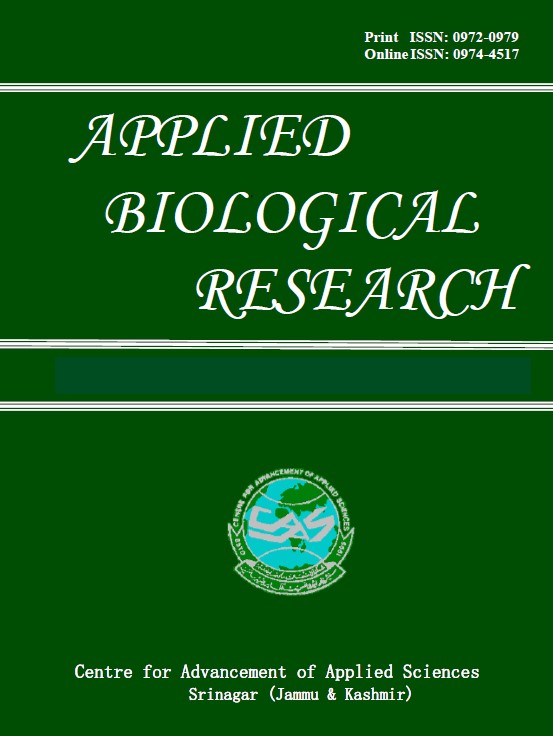EVALUATION OF in vitro AND in vivo MANAGEMENT STRATEGIES AGAINST STEM GALL OF CORIANDER CAUSED BY Protomyces macrosporus (Unger.)
DOI:
https://doi.org/10.48165/Keywords:
Bioagents, botanicals, coriander, fungicide, stem gallAbstract
The present study was aimed to evaluate the effect of different biocontrol agents, botanicals and fungicides on crop yield and stem gall disease of coriander (Coriandrum sativum L.), caused by Protomyces macrosporus Unger. The effectiveness of plant leaf extracts, fungicides and bioagents were evaluated against the test fungus under in vitro conditions by using poisoned food technique and further evaluated under field conditions for disease managemenand crop yield improvement. Among the biocontrol agents and botanicals evaluated, Pseudomonas fluorescens and datura leaf extract were most effective in in inhibiting the pathogenic growth; whereas amongst fungicides, metalaxyl + mancozeb @ 0.2% and copper oxychloride @ 0.2% were significantly superior with 100% pathogenic growth inhibition under in vitro conditions. Under field conditions, seed treatment and foliar spray of metalaxyl + mancozeb and copper oxychloride @ 0.2% proved most effective in managing the disease as well as improved crop yield (1493.06 and 1284.72 kg ha-1, respectively) in comparison to the control (729.17 kg ha-1).
Downloads
References
Bilgrami, K.S., Jamaluddin and Rizvi, M.A. 1991. Fungi of India - Lists and References. Today and Tomorrow’s Printers and Publishers, New Delhi, India.
S. Vijay Kumar and Kushal Raj
Coskuner, Y. and Karababa, E. 2007. Physical properties of coriander seeds (Coriandrum sativum L.). Journal of Food Engineering, 80: 408-416.
https://www.indiastat.com/table/agriculture/2/coriander/19559/337538/data.aspx. Khan, M.R. and Parveen, G. 2016. Screening of some recently developed coriander varieties against stem gall disease caused by P. macrosporus. Journal of Plant Pathology and Microbiology, 7: 1-3.
Khan, M.R. and Parveen, G. 2018. Supplementing biocontrol agents with botanicals improved growth and yield of coriander (Coriandrum sativum L.) infected with P. macrosporus Unger. Current Plant Biology, 15: 44-50.
Kumar, G., Yadav, S.K., Patel, J.S., Sarkar, A. and Awasthi, L.P. 2014. Management of stem gall diseases in coriander using Pseudomonas and Trichoderma (bioagents) and fungicides. Journal of Pure and Applied Microbiology, 8: 1-4.
Lahlali. R., Bajii. M. and Jijakli. M.H. 2007. Isolation and evaluation of bacteria and fungi as biological control agents against Rhizoctonia solani. Communications in Agricultural and Applied Biological Sciences, 72: 973-982
Malhotra, S.K. 2016. Research and development of seed spices for enhancement of productivity and profitability in the era of climate change. Indian Journal of Arecanut, Spices and Medicinal Plants, 18 (1): 3-18.
Meena, R.P. 2012. Bio-efficacy of plant extracts for management of purple blotch disease of onion (Allium cepa). Indian Phytopathology, 65: 253-257.
Mima, K., Kothikar, R.B. and Patil, C.U. 2009. Fungicides and botanicals for managing foliar diseases of turmeric. Journal of Plant Disease Sciences, 4: 68-71.
Piperkova, N. 2014. In vitro screening of fungicides for yeast like form of Taphrina deformans. Agricultural Sciences, 6: 33-38.
Sahib, N.G., Anwar, F., Gilani, A.H., Hamid, A.A., Saari, A. and Alkharfy, K.M. 2012. Coriander (Coriandrum sativum L.) a potential source of high-value components for functional foods and nutraceuticals. Journal Phytotherapy Research, 27(9): 25-33.
Singh, A.K. 2010. Integrated management of stem gall (P. macrosporus) of coriander. Journal of Mycology and Plant Pathology, 40: 128-130.
Verma, P., Meena, D.S., Jadon, C. and Singh, D.K. 2017. Effect of sowing time and management practices on incidence of stem gall and seed yield of coriander (Coriandrum sativum L.). International Journal of Seed Spices, 7(1): 79-81.
Vincent, J.M. 1947. Distortion of fungal hyphae in presence of certain inhibitors. Nature, 150: 850. Wang, J., Jian, L., Jiankang, C. and Jiang, W. 2010. Antifungal activities of neem (Azadirachta chtaindica) seed kernel extracts on postharvest diseases in fruits. African Journal of Microbiology Research, 4: 1100-1104.

